 Petzlover
Petzlover PekePoo is originated from United States but Mudi is originated from Hungary. PekePoo may grow 21 cm / 8 inches shorter than Mudi. Both PekePoo and Mudi are having almost same weight. Both PekePoo and Mudi has almost same life span. PekePoo may have less litter size than Mudi. Both PekePoo and Mudi requires Moderate Maintenance.
PekePoo is originated from United States but Mudi is originated from Hungary. PekePoo may grow 21 cm / 8 inches shorter than Mudi. Both PekePoo and Mudi are having almost same weight. Both PekePoo and Mudi has almost same life span. PekePoo may have less litter size than Mudi. Both PekePoo and Mudi requires Moderate Maintenance.
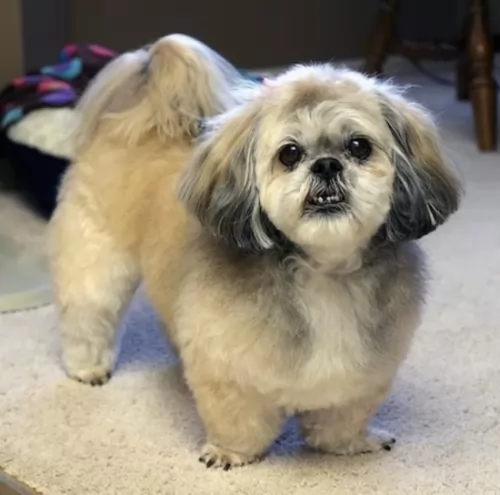 As a cross between a Peingese and a Poodle, your cute Peekapoo as he is also known, isn't a purebred dog. They first started making their appearance in the 1900s, in fact it was believed to be developed in the 1950s, being one of the oldest designer dog breeds.
As a cross between a Peingese and a Poodle, your cute Peekapoo as he is also known, isn't a purebred dog. They first started making their appearance in the 1900s, in fact it was believed to be developed in the 1950s, being one of the oldest designer dog breeds.
He was bred to be a a low-shedding, hypoallergenic companion dog. Both the parent dogs have their own unique, long histories. Dog experts aren’t too sure where the Pekepoo originated from.
This dog breed isn’t recognized by the American Kennel Club, because it is a hybrid breed, but it is recognized by the American Canine Hybrid Club.
 Sometime between the 4th and 6th centuries, the Great Migration – a variety of dogs came to live in the Carpathian Mountains on the Great Hungarian Plain. This migration period brought sheepdogs and herders brought by shepherds. These dogs were of two sizes both small and large. The smaller ones were bred together – Pumi, Puli, and Mudi. Because of this, these breeds share the same history, with the Mundi being the oldest of them all.
Sometime between the 4th and 6th centuries, the Great Migration – a variety of dogs came to live in the Carpathian Mountains on the Great Hungarian Plain. This migration period brought sheepdogs and herders brought by shepherds. These dogs were of two sizes both small and large. The smaller ones were bred together – Pumi, Puli, and Mudi. Because of this, these breeds share the same history, with the Mundi being the oldest of them all.
The Mundi was finally separated from the other breeds about 1930 when Dr. Deszo Fenyesi began to breed them. It was in 1966 when the F.C.I. finally approved the standard for the breed. Still then as today, there were not many breeders developing the Mudi. They are working dogs – farm dogs – herders, guard dogs and ratters. He is also known as a tracker, with the majority of the breed living in Hungary.
As the Mudi was bred separately from the Pumi and the Puli, differences between the breeds became clear. Many Mudi are born with a stump or no tail at all. The Mudi is not a great dog for the first timer. He is stubborn, assertive and needs a lot of socialization and exercise. In 2004 breeders in the United States created the Mudi Club of America to preserve the breed and foster responsible ownership. This is a clever, active and keen breed, very loyal to his family but wary of strangers. The United Kennel Club recognized the breed in 2006.
In Hungary, these are still a breed of herding dogs capable of running 500 sheep at a time. They are versatile, courageous, intelligent and agile. They are great in obedience trials, agility, and flyball. In Finland and the United States, they also work as search and rescue dogs.
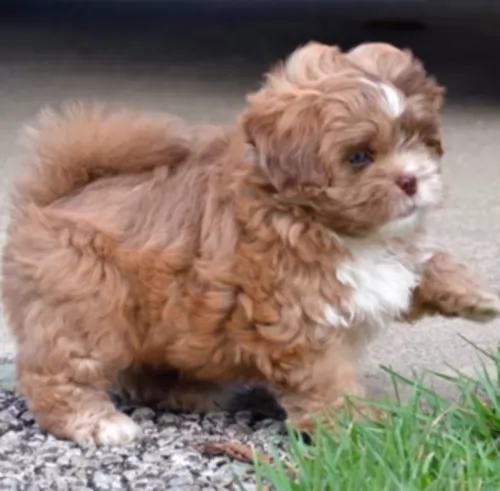 People love these little dogs because of their lack of shedding and it having a hypoallergenic coat. The coat is soft and can be wavy to curly with some feathering around the ears and tail.
People love these little dogs because of their lack of shedding and it having a hypoallergenic coat. The coat is soft and can be wavy to curly with some feathering around the ears and tail.
It is medium length and comes in a variety of colors such as fawn, cream, white, black, apricot or chocolate. The coat can have a mix of some of these colors too. This is a small dog that stands at between 23–26cm and weighs in the region of 4 to 9kg. He has floppy, low set ears and bright brown eyes.
They're such cute little dogs, loving and loyal to their human family. However, there is another side to them and they can be independent, aloof and stubborn. They’re very intelligent little dogs and will require both mental and physical stimulation to prevent boredom.
Because’s he’s so smart, you won’t have any trouble training him new skills. He’ll do well with children in the home as well as with pets, especially once he’s been trained and socialized.
He is able to settle into life in the city or the countryside. Even though he is a small dog, he will have to have his share of exercise if he is to remain healthy and content. They are dogs that love to be cuddled and petted ad he gets along well with everyone in the family.
Even though he is a true family pet, loving and loyal, he becomes a good watchdog too as he wants to protect all those he loves.
 This is a medium size dog with an almost square profile. They have erect ears on wedge-shaped heads. He is not a strong boned but medium boned. That square profile is based in large part on their very square stance. Their muzzle is about half the length of their head and they have what is considered a “dare devil” expression in their dark, almond-shaped eyes. The color of the eyes is important and must match with the color of the dog or the standard is not met.
This is a medium size dog with an almost square profile. They have erect ears on wedge-shaped heads. He is not a strong boned but medium boned. That square profile is based in large part on their very square stance. Their muzzle is about half the length of their head and they have what is considered a “dare devil” expression in their dark, almond-shaped eyes. The color of the eyes is important and must match with the color of the dog or the standard is not met.
Merle fur – brown, brown speckled, blue eyes.
Brown or gray-brown fur – Brown eyes
Gray fur – gray eyes
What is not acceptable is having yellow eyes and black fur; pink eyes and white fur. The lips, eye rims, and nose must all have the same pigmentation. This should be black in all but the brown and brown-grey dogs. These dogs have brown noses, eye rims, and lips. The tail can be almost anything from full to bob. All are considered to be natural lengths for a Mudi.
Their coat is self-cleaning and won’t mat. It is on the long side. In fact, a short, flat, smooth coat is a disqualification from the standard. The color of the coat ranges from white to brown to gray, gray-brown, merle, golden, cream and white. Very little markings of any kind are usual.
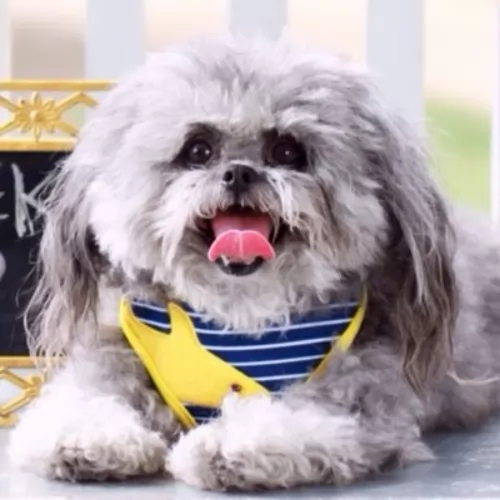 Your Pekepoo is such a gentle, sweet dog, making the perfect family pet. He is gentle, loving and amicable with his human family and wants to be involved in all their activities.
Your Pekepoo is such a gentle, sweet dog, making the perfect family pet. He is gentle, loving and amicable with his human family and wants to be involved in all their activities.
Coming from the Poodle and the Pekingese, he will have inherited some personality from each of these two popular dog breeds.
He is coming into your home ready to make you a splendid pet and companion and he asks nothing more than good care from you as a responsible dog owner.
 Yes, they are great with children and love being a part of a large family or “pack”.
Yes, they are great with children and love being a part of a large family or “pack”.
They are extremely versatile and great at herding and guarding.
They are adaptable if you are. They don’t need to live in the country, but they need space to run and play.
They are highly intelligent but a little stubborn. Their ability to learn is high but you have to be the boss.
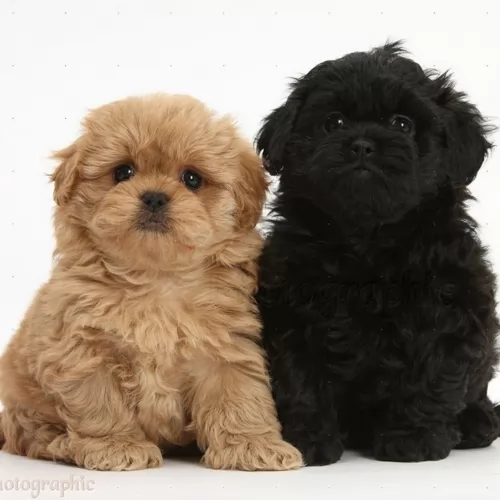 As with any dog, there are certain common dog ailments that you want to watch out for in your Pekepoo. Brachycephalic airway syndrome is one as well as dental disease and obesity.
As with any dog, there are certain common dog ailments that you want to watch out for in your Pekepoo. Brachycephalic airway syndrome is one as well as dental disease and obesity.
Because your Pekepoo has a somewhat squashed face, he may have abnormalities in the upper airways. Dogs with this syndrome have heavier breathing than other dogs and he might even have a cough. The troublesome part is that these breathing difficulties can put pressure on the cardiovascular system.
Small breed dogs are always at an increased risk of being obese and being obese can mean your dog possibly developing osteoarthritis, diabetes, cardiovascular disease, high blood pressure as well as other diseases.
 The Mudi does face several of the problems that medium to large dogs often face and some eye issues as well.
The Mudi does face several of the problems that medium to large dogs often face and some eye issues as well.
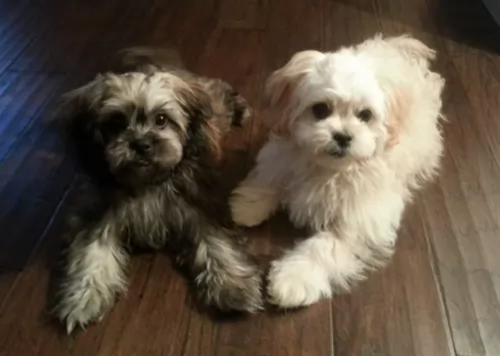 Your small designer Peekapoo will do well on a high quality kibble diet. Always check out the packaging and see how much to feed a small dog like this. It is better to give a dog 2 smaller meals a day as composed to one because with one they tend to gobble it up which can lead to a serious condition known as bloat.
Your small designer Peekapoo will do well on a high quality kibble diet. Always check out the packaging and see how much to feed a small dog like this. It is better to give a dog 2 smaller meals a day as composed to one because with one they tend to gobble it up which can lead to a serious condition known as bloat.
Dogs love simplicity and consistency with their food, but it is always to your dog’s benefit to feed him some home-made food too. Some chopped up boiled chicken, brown rice or pasta and some vegetables such as spinach, carrots and sweet potato added into the kibble occasionally will do him the world of good. Every now and again a little bit of raw meat can also be given.
Never leave your pet without a bowl of fresh, cool water.
Lively and energetic, your Peekapoo is going to need daily exercise. He will love the chance to sniff around and explore on your daily walks but he is ready to become more involved than that and will join you with hikes and swimming too. He is happiest when spending activity times with his human family. As with any dog, just make sure he doesn’t overdo it, especially on a hot day.
To keep your Pekepoo’s hair tangle-free, you’ll need to brush it twice a week. If you feel that his hair is getting too unruly, you can take him to the doggy parlor and have it trimmed into a shorter style. They’ll clip his nails at the same time, check inside his mouth for any signs of dental disease and check inside his ears too for dental infection.
 The Mudi needs a high quality, medium breed puppy dry food and should be fed 3 or 4 times a day for a total of 1 and ½ to 2 cups.
The Mudi needs a high quality, medium breed puppy dry food and should be fed 3 or 4 times a day for a total of 1 and ½ to 2 cups.
The adult should be fed at least twice a day with an adult medium breed high-quality dry dog food. Don’t overfeed as the breed can have a tendency toward obesity.
They have great stamina and agility.
This is a working dog and like most herding dogs, they need a job and a lot of activity. Long walks every day and either a large yard or visits to a dog park. Involve them in herding activities or Barn Hunt if you can. Playing is their way of working when they are not herding real animals. So, if you want this breed, be sure you have time for playing with them. They are great at agility, flyball, obedience, frisbee trials, tracking and of course herding